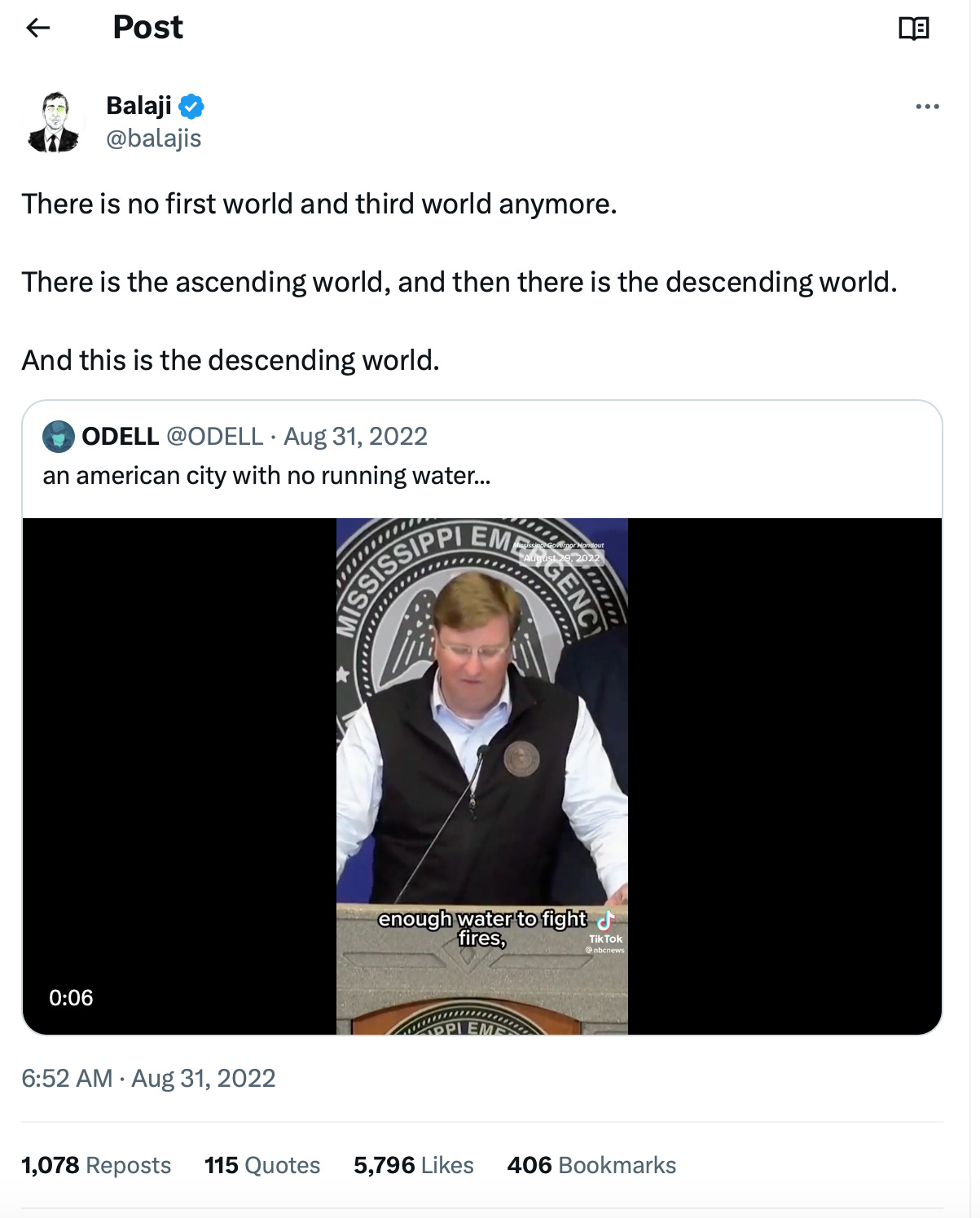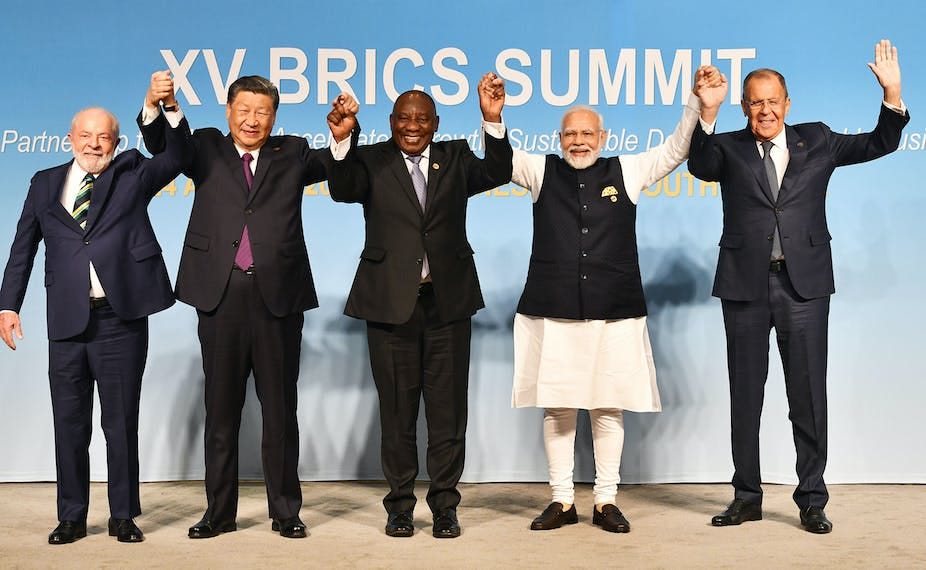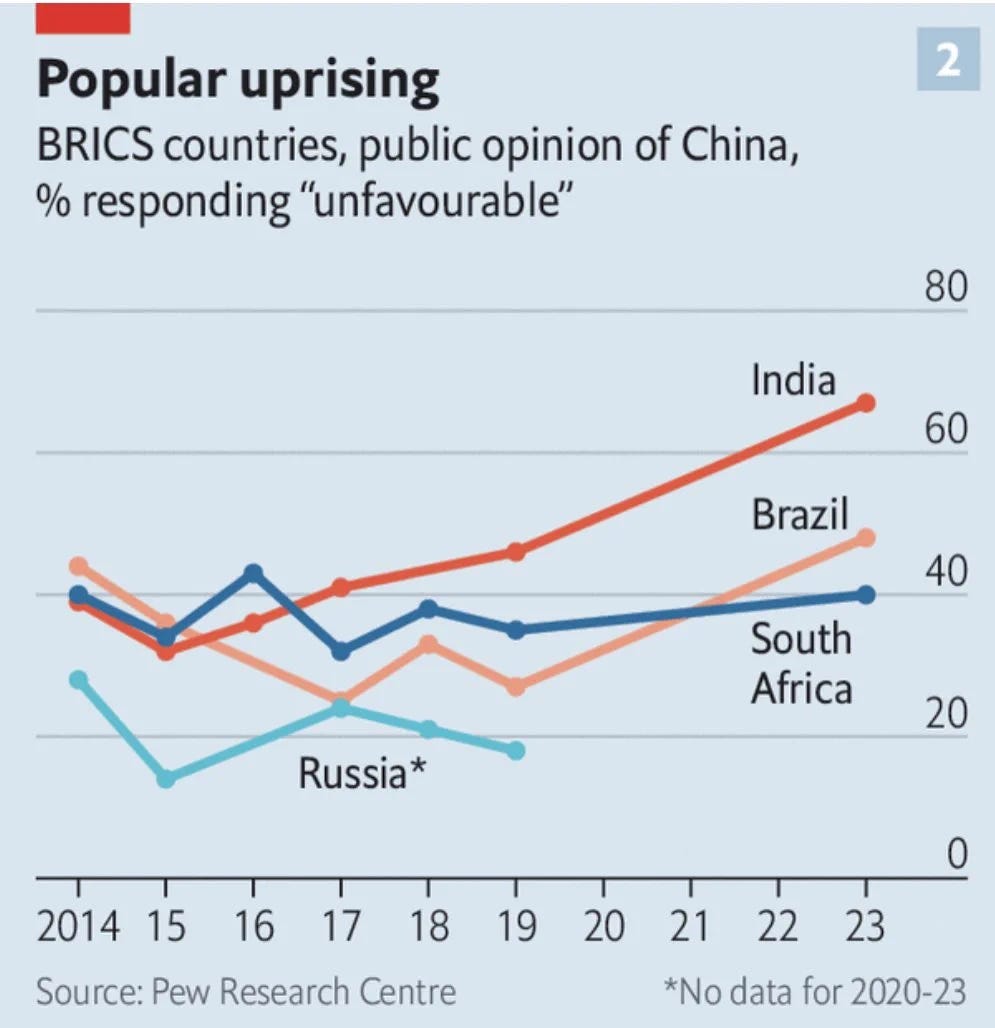Another BRIC in the wall
What BRICS expansion means for the UK, and what you can learn from them
I don't remember much of what I learned at school - particularly from Year 9 Geography - but for some reason, I distinctly remember learning about the "BRICS".
I think I mostly remember learning the acronym, but I also remember being interested by the idea that this group of countries could learn from the journeys of already developed nations that had been taking place over the last 50+ years. The idea that these counties could use those ideas and the work that went into them to accelerate and grow over a much shorter timescale, was something that stuck with me.
Rather than try and totally re-hash what I would have learned 20 years ago, I asked chatGPT to come up with how the topic of the BRICs may have been taught in a Geography lesson in 2004:
The term "BRIC" was coined by Jim O'Neill of Goldman Sachs in a 2001 paper titled "The World Needs Better Economic BRICs". This pivotal document identified Brazil, Russia, India, and China as emerging powerhouses in the global economy.
Why are the BRICs important in 2004?
Economic Growth: In 2004, these countries experienced economic growth rates surpassing many established economies.
Potential: The BRICs represent some of the most populous nations in the world. Combined, they account for a significant chunk of the world's population.
Shift in Global Power: Even in 2004, a clear shift was occurring. Traditional Western powers, while still dominant, are starting to share the global stage with these emerging economies.
Investment Opportunities: With rapid growth and development come ample opportunities for investments. Many international corporations and investors are turning their eyes towards these nations.
Challenges to Global Norms: As these countries grow, they're starting to challenge existing global norms and standards. Be it the economic models, political strategies, or approaches to development, they're introducing new ways of thinking which the world is taking notice of
20 years on, and the BRICS (now also including South Africa) are now a formal bloc with big plans. They were making headlines last month with a summit held in South Africa and the announcement that Iran, Saudi Arabia, the UAE, Argentina, Egypt and Ethiopia are set to join the bloc in 2024.
(That does challenge the acronym somewhat… BRICUSEAS? ICEBRUISES??)
If the BRICS, particularly an expanded BRICS (…ICEBRUISES), starts to deliver, it could mark a huge shift in how the world is run. These are big words, but the stats below highlight the significance of the combined power they wield:
Even before the expansion:
Together, the BRICS constitute 40% of the world's population
The combined size of their economies equates to around 30% of global GDP, similar to the G7. In the next decade, nearly all projections suggest that BRICS will surpass the G7 on GDP and PPP measures.
Pre-expansion BRICS account for around 16% of global oil production. Post-expansion - that will grow to approximately 44%, mainly down to the addition of UAE and Saudi Arabia. (The US is still the largest producer at around 20% but is still a marginal net importer)
According to WTO, the BRICS share of global exports is 20%.
All of these point to a bloc with significant power on the world stage, which will only grow as they become the ICEBRUISES. It’s fair to say they delivered on many of the promises from Jim O’Neills original paper, and the theories from my geography textbook.
What does this mean for the UK?
Zoom out far enough, and the world order seems to be changing. What was the developed world and the developing world, many now refer to the ascending world and the descending world.
The most pertinent example of comparison for the UK is India. A colony of the UK until 1947, India is now not only a bigger economy, but fortunes are going in polar opposite directions.
The UK's challenges are well documented; meanwhile, India has found itself able to land on the moon. (Side note: 3 of the 4 countries that now have footprints on the moon are in the BRICS). 1950, the UK accounted for over 10% of global exports, currently around 3%. Meanwhile, India is exporting more software engineering than the UAE exports oil. Talk about ascending vs. descending.
I plan on writing a future post about remote work's impact on the UK. Some argue that it was the best thing to happen for the developing world. Previously, many jobs were limited by geography and, therefore, concentrated in big cities such as London. Remote work has levelled the playing field and in many roles, creates the ultimate meritocracy, opening the door for talented individuals regardless of their global location. This has further contributed to BRICS acceleration, and is likely to be a tailwind for counties like India in particular for decades to come.
These kind of shifts are rare, and once they begin, you can only imagine that they are difficult to reverse. If the UK really is part of the “descending world” then one could argue that the challenges we face today are just the beginning.
Are BRICS Solid?
This direction of travel sounds very promising for the ICEBRUISES and worrying for the UK and the rest of the G7. Perhaps a new world order led by the emerging bloc is an inevitability.
However, as many have pointed out in the last few weeks, the BRICS have yet to achieve anything. At all.
In Noah Smith's blog Noahpinion, the following two paragraphs summarise what the BRICS have achieved since its inception.
In 2009, [the BRICS] started meeting regularly and trying to think about how to create their own economic institutions — a New Development Bank to compete with the World Bank, a Contingent Reserve Arrangement to lend each other money in times of currency crisis (something the IMF usually does), a system of submarine fibre-optic cables, and so on.
This, too, did not end up working out. The New Development Bank has disbursed almost no loan money, causing Jim O'Neill to declare it a disappointment. When Russia invaded Ukraine in 2022, the NDB cut ties with it. The Contingent Reserve Arrangement has done nothing, and the BRICS Cable never happened.
The second paragraph points out something significant. Despite the handholding and embracing publicly, with global tensions on the rise, do the BRICS actually get on?
India and China have a reasonably tense relationship. They will continue to be strategic rivals as India becomes one of - if not the - most influential countries globally. In fact, the view of the other BRICS countries have on China has shifted in recent years, as the below graphic from the economist shows:
Global tensions over Russia's actions in the past few years have also caused disagreement between the existing BRICS and the new members. India, South Africa and Brazils publicly declared "neutrality" regarding the conflict, hardly resembles a tight-knit alliance.
They are some even more fundamental differences between the counties, where India and Brazil are focused on maintaining healthy democracies, China and Russia are not.
With a lack of coherent direction, is it any wonder the BRICS have failed to achieve anything together, despite their public desires and the significant resources they boast?
Learnings for us
All in all, the tale of the BRICS is an interesting one and one that is still evolving.
If I had the ability to go back to speak with Jack in his year 9 geography class, rather than just learning the acronym and moving on, I would encourage him to think a bit deeper and challenge him to find some lessons we can take from the BRICS, their successes as individual countries, and their "failings" as a bloc, such as…
Accelerated learning through others - part of the reason that Jim O'Neill first wrote about the BRICS was that they were successfully taking learnings from countries that were further on in their development. They took those learnings and were then able to apply them and grow faster than the developed countries had been able to. Whatever journey you are on, there are doubtless others who have followed the same path, with the same goals and are further ahead. Study them, figure out what they did, and learn from it. Avoiding their mistakes, and focusing on their most impactful actions is a sure fire way to accelerate your own learning.
Think long-term - another topic I will come back to in future posts. Perhaps the framing of ascending vs descending world just points to the reality that the world works in cycles. Having a vision and sticking to it, and being able to take advantage of your time when it comes, is something it feels like India is set to reap the rewards of in the coming years. I think we can all learn something from that.
Resources are only helpful if you're moving in a consistent direction - the BRICS have a wealth of resources and power but have yet to achieve anything. As an individual or a team, no matter how much knowledge or experience you have, you need to be aligned to get anything done. For me, things happen when I focus on one goal and use all my resources wisely in service of that goal. When I am unsure of which direction to take, I can have as much motivation and energy as I like; not much of note is going to happen. With coherent focus, resources are meaningful. Without them, they are not.
I wonder if I’d have delivered more than the BRICS by now…





I think history shows that this is just “how the world evolves” what staggers me is that the failing country’s ( inc the UK ) fail to see that their time is past. We are neither “Great” or “United” we need to learn not to further isolate our selfs and to work alongside the emerging countries wherever possable. But I just do telesales….. what do I know. Great article Jack. Thank you. Sally Wilkinson.